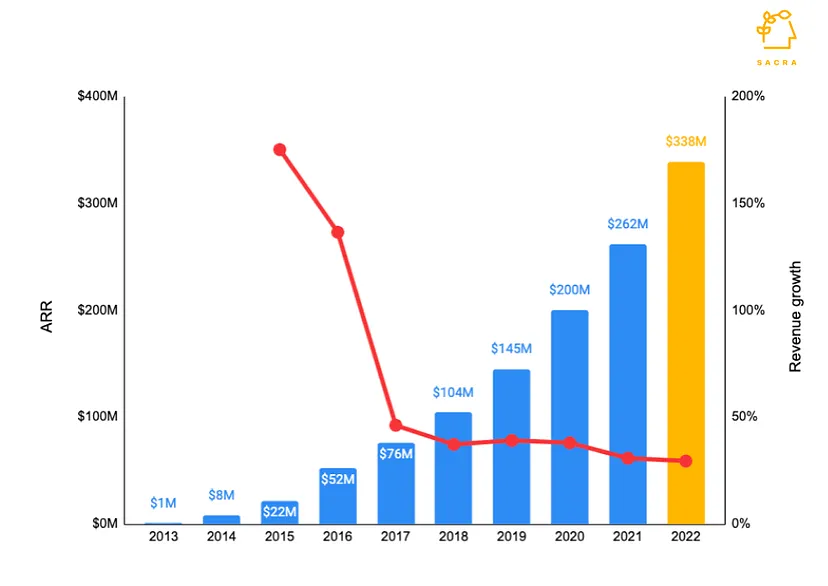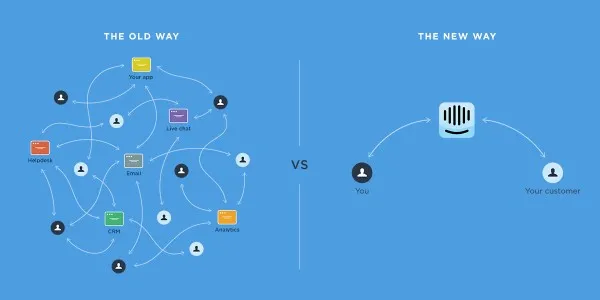



Intercom Software: Revolutionizing Customer Support
In the wake of technological advancement, businesses continuously evolve strategies to cater to customer needs. There has been an unprecedented surge in digital commerce, making customer experience the cornerstone of success. As we delve into this critical subject, we’ll mainly focus on the role of Intercom software, a renowned name in customer support and helpdesk, and its offerings, including chatbots, product tours, proactive messages, email campaigns, and self-serve support.
The Emergence of Software as a Service (SaaS) in Customer Support and Helpdesk

SaaS has revolutionized businesses, offering scalable, cost-effective, and flexible solutions. It is especially beneficial in customer support, facilitating efficient, round-the-clock service to customers worldwide. Intercom software, a notable player in this category, has been at the forefront, providing a comprehensive suite of tools to streamline communication and improve customer experience.
Empowering Business Owners with Intercom's Comprehensive Suite of Tools
Intercom particularly benefits business owners seeking to enhance customer relationships and foster growth. The platform’s diverse offerings – chatbots, product tours, proactive messages, email campaigns, and self-serve support – are ingeniously designed to help you engage, support, and retain customers, propelling your business toward higher profitability.
Unpacking the Unique Features of Intercom within the Customer Support and Helpdesk Category
As we proceed, we will explore how Intercom stands out within the Customer Support and Helpdesk category. Intercom’s distinct features, such as real-time messaging, customer segmentation, and automation capabilities, contribute to a superior customer experience, differentiating it from other solutions in the market.
Throughout this journey, we invite you to understand Intercom’s offerings and competitive positioning better and determine if it is the right choice for your business needs.
Delving into the Depths of Intercom Software
In this section, we will explore the intricate world of Intercom software, a revolutionary tool in the Customer Support and Helpdesk arena. We’ll delve into the history, development, and unique features that make Intercom an unbeatable ally for any business owner.
A Glimpse into the Past: The Genesis of Intercom

Intercom’s journey began with a simple mission: to make business personal again. Born in 2011, Intercom has continuously developed and evolved, positioning itself as a game-changer in the customer support sector. Understanding how the software grew, transforming from a simple live chat tool to a comprehensive platform offering chatbots, product tours, proactive messages, email campaigns, and self-serve support, is fascinating.
Unpacking Intercom's Unique Features
Intercom is not your average customer support software. Its innovative features are designed to empower business owners and improve customer satisfaction significantly. Let’s break down these key components:
1. Chatbots: An AI-driven feature, the chatbot to Intercom provide instant, 24/7 customer support, answering queries and escalating issues as needed.
2. Product Tours: These guided tours can help onboard new users, highlight new features, or show a user through a complex process.
3. Proactive Messages: Proactive messaging allows businesses to engage customers before they even realize they need help. These can be used to provide updates, promotions, or tips.
4. Email Campaigns: Intercom’s email campaigns help keep your audience engaged and informed, driving customer retention and loyalty.
5. Self-Serve Support: The self-serve support feature allows customers to find solutions independently, reducing the load on your support team and improving customer satisfaction.
The Benefit Landscape: How Intercom Empowers Business Owners
Now that we understand the tool’s capabilities let’s explore the tangible benefits that Intercom offers its users. Numerous studies and statistics illustrate how Intercom can boost customer satisfaction, increase retention, and drive revenue growth.
Intercom: A Class of its
Finally, it’s essential to comprehend how Intercom differentiates itself within the customer support and helpdesk product category. It’s not just about the unique features but also how Intercom uses these tools to provide a seamless and holistic customer support experience.
The Intercom Advantage: A Comparative Analysis with Competitors
Intercom has emerged as a notable player in the competitive arena of Customer Support and Helpdesk solutions. But what differentiates it from its well-known competitors such as Zendesk, Freshdesk, Help Scout, and Zoho Desk? Let’s delve deeper.
Understanding the Competitors
Our comparative analysis begins with a comprehensive understanding of the competitive landscape. Zendesk, Freshdesk, Help Scout, and Zoho Desk offer robust customer support solutions. However, each has its unique strengths and weaknesses.
Zendesk prides itself on being a multi-channel customer service platform, while Freshdesk offers automation capabilities that simplify the customer support process. Help Scout is renowned for its user-friendly interface, and Zoho Desk shines with its context-aware helpdesk software.
The Superiority of Intercom
While each competitor has its strengths, Intercom’s unique features give it a distinct edge. Intercom’s proactive messaging, customizable chatbots, and personalized product tours are just a few standout aspects that enhance customer engagement.
Intercom’s software integrates seamlessly with other tools and platforms, making it a versatile business choice. Plus, its robust analytics provide invaluable insights to help companies better understand customer behavior.
Where Competitors Fall Short
Every platform has its pitfalls, and Intercom’s competitors are no exception. For instance, Zendesk’s interface may seem complex to some users, while Freshdesk may need more customization options than Intercom offers. Help Scout may provide a different level of analytics depth, and Zoho Desk’s automation features might be less advanced than Intercom’s.
These shortcomings further establish Intercom’s superiority in providing a holistic, user-friendly, and advanced customer support solution.
Intercom’s innovative feature set, user-friendly interface, and robust integrations make it a superior choice in the Customer Support and Helpdesk category. The following sections will dive deeper into these advantages, clearly showing how Intercom can enhance your customer support capabilities.
Unveiling the Uniqueness: Highlighting the Advantages of Intercom Software
Intercom stands out due to its distinctive capabilities in the vast realm of customer support solutions. The beauty of Intercom lies in its unique blend of powerful features and user-centric design. These are meticulously crafted to ensure businesses can provide top-notch customer service with maximum efficiency.
Unique Selling Points of Intercom

Intercom is not your average customer support software. It’s a well-designed suite of tools that bring an array of functionalities to the table, all designed to ensure your customers receive the best possible service. Its unique selling points include:
1. Customizable Chatbots : It can automate routine customer interactions, freeing up your customer service agents for more complex tasks. Plus, they’re customizable to fit your brand’s voice and tone.
2. Product Tours : Interactive product tours help new users understand your product or service, reducing customer confusion and support tickets.
3. Proactive Messages : Intercom allows you to send proactive messages based on user behavior, helping you engage customers at the right moments.
4. Email Campaigns : With Intercom, you can run targeted email campaigns to nurture leads and increase customer retention.
5. Self-serve Support : Intercom’s Help Center enables customers to find answers independently, reducing the burden on your support team.
Intercom's Extra Edge: Above and Beyond the Basics
In addition to the unique selling points, Intercom offers an extra layer of benefits that give it a competitive edge:
1. Integration Capabilities : Intercom seamlessly integrates with various third-party applications, making it easy to incorporate into your existing tech stack.
2. User-friendly Interface : Intercom’s intuitive, user-friendly interface simplifies the customer support process, making it easy even for non-tech-savvy users.
3. Robust Analytics : Intercom provides deep analytics that helps you understand your customer behavior, enabling you to make data-driven decisions.
Real-world Effectiveness of Intercom
Intercom’s advantages aren’t just theoretical. Numerous businesses have reaped real-world benefits from using Intercom’s software, experiencing improvements in customer satisfaction, efficiency, and overall growth.
In the following section, we will guide you on making an informed decision between Intercom and its competitors, helping you understand why Intercom’s unique advantages make it the right choice for your business.
Making an Informed Decision: Choosing Between Intercom and Competitors
Making the correct choice between different customer support and helpdesk tools can be an overwhelming task. But with a structured approach and a clear understanding of your business needs, you can navigate the decision-making process effectively.
A Recap of the Comparative Analysis
We’ve compared Intercom software with significant competitors like Zendesk, Freshdesk, Help Scout, and Zoho Desk. In terms of customization, user-friendliness, integrations, and analytical capabilities, Intercom stands out as a comprehensive customer support and helpdesk solution. However, aligning your choice with your specific business needs is essential.
Evaluating Your Specific Needs
Understanding your unique business needs is critical to choosing the right customer support software. Here are some considerations:
1. Size and nature of your business : Large enterprises may require different features than small businesses or startups.
2. Type of customer interactions : Do you need a tool primarily for email support, live chat, phone support, or a combination?
3. Budget : Are you looking for a low-cost solution or willing to invest more for a comprehensive set of features?
Expert Tips on Selecting the Best Customer Support Provider
1. Scalability : Consider whether the tool can grow with your business. Does it offer additional features or tiers you can use as your needs evolve?
2. User Experience : Check out the user interface. Is it intuitive and easy to use?
3. Customer Support : Does the provider offer reliable and responsive customer support?
Wrapping Up: Intercom's Competitive Edge in the Customer Support Landscape
Navigating the world of customer support and helpdesk solutions can be daunting. Still, understanding Intercom’s robust features, key benefits, and how it stands up against competitors can make the decision-making process more manageable.
The Intercom Journey Recap
We’ve explored chatbots, product tours, proactive messages, email campaigns, and self-serve support and how these tools can offer businesses a decisive edge in customer engagement. From its history and development to its real-world applications and unique selling points, Intercom has proven to be a leader in the SaaS Customer Support and Helpdesk industry.
The Unique Value Proposition of Intercom
Reiterating the unique selling points, Intercom’s customer-centric approach stands out. Its focus on personalization, real-time engagement, and seamless integration across various platforms provides a comprehensive solution for businesses seeking to improve customer interactions.
Discover More About Intercom
While this guide provides an overview of Intercom software and its advantages, there’s still much more to explore. Encourage your exploration by diving deeper into specific features, checking out product demos, or trying out a free trial.
In the ever-evolving digital landscape, having a reliable customer support and helpdesk tool is not just an advantage but a necessity. Intercom’s impressive array of features and its focus on customer engagement make it a viable contender in the market.
Intercom
Tags
The chatbot is designed to help businesses automate a significant portion of their customer interactions. The chatbot can instantly understand and respond to common customer queries using artificial intelligence. This allows firms to provide round-the-clock service even when their customer support team is unavailable. Moreover, it leaves more complex questions to the support team, enabling them to focus on issues that require human intervention. Ultimately, this leads to improved customer service, increased productivity, and potentially significant cost savings.
Intercom’s product tours are interactive guides that show new users how to use a product or service. These tours are highly effective because they allow users to learn practically, hands-only, and directly within the product interface. These can be tailored to suit your product perfectly. And branding and triggered based on specific user actions or stages in the user journey. This leads to faster onboarding, increased user engagement, and lower churn rates.
With Intercom’s proactive messaging feature, It is possible to send personalized messages to users depending on their actions. Preferences, or stage in the customer journey. For instance, if a user has not engaged with your product for a while, you can send a message offering help or highlighting new features they find helpful. Or, if a user is frequently using a particular feature, you can send a message to provide tips or suggest related features. This proactive approach can significantly boost engagement and customer satisfaction.
Intercom’s email campaigns are designed to be highly personalized and triggered by user behavior. This means each recipient receives a relevant and timely message, leading to higher engagement and conversion rates. Unlike many traditional email marketing tools, Intercom allows for user segmentation and targeting based on different criteria. Rich behavioral data and automatically send emails at optimal times to increase the likelihood of engagement.
Intercom’s self-serve support allows customers to find answers to their questions instantly without contacting a support representative. This can be achieved through knowledge bases, FAQ sections, or chatbots. This approach benefits both the business and the customer – the customer gets instant answers, and the support team can focus on resolving complex issues that can’t be handled through self-service.
Intercom offers several features that differentiate it from other customer support and helpdesk tools. For instance, its user-friendly interface and customizable chatbots provide a more engaging customer experience. Its product tours help with user onboarding and retention, and its proactive messaging can lead to increased customer engagement. However, it’s important to remember that each tool has its strengths; the ideal option for your business will vary based on its unique requirements. Goals and budget.
Intercom has a scalable architecture that can handle increasing customer interactions as your business grows. Furthermore, Intercom provides valuable insights and analytics to help you better understand your customer behavior, identify trends, and improve your customer support strategy. This data-driven approach can contribute significantly to business growth.
Intercom offers a wide range of integrations with other popular software tools. For instance, you can integrate it with your CRM to enhance your sales and customer service processes or with your marketing automation tool to align your marketing and customer support efforts. These integrations can streamline workflows, improve data sharing across devices, and ultimately increase operational efficiency.
While Intercom is versatile and can be adapted to businesses of all sizes and types, it’s particularly effective for businesses with an online presence, such as SaaS companies, e-commerce businesses, and online service providers. These businesses often require efficient and instant online customer support, where Intercom’s chatbots, product tours, and proactive messaging shine.
Intercom contributes to customer satisfaction in several ways. Its chatbots provide instant responses, which customers appreciate. Its proactive messages allow businesses to provide timely and personalized support. Its self-serve options let customers find solutions at their convenience. And its user-friendly interface makes all interactions enjoyable. Plus, it helps customer support teams manage their workloads more efficiently, leading to quicker response times and higher-quality support.



